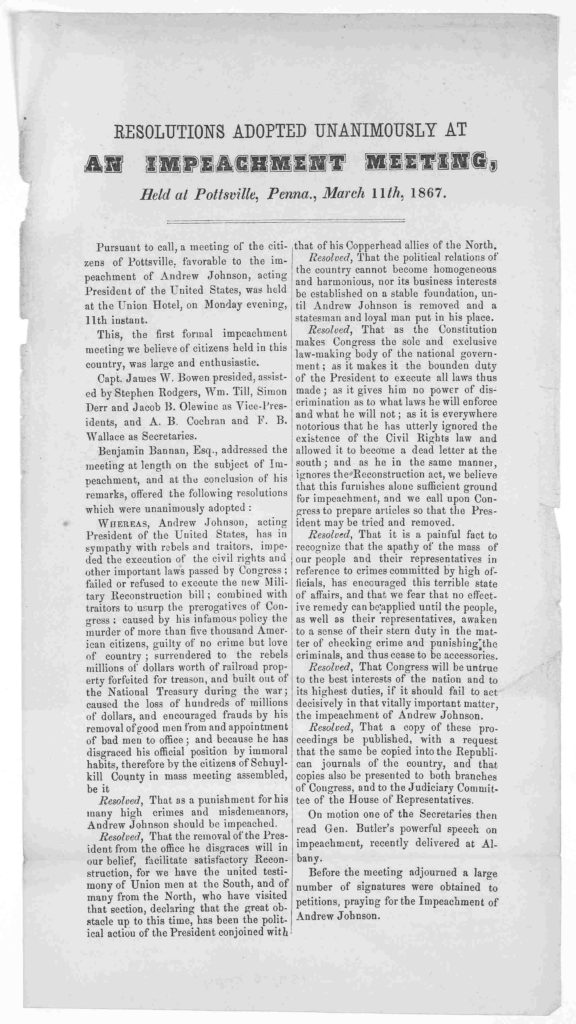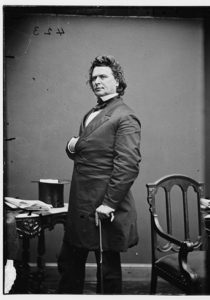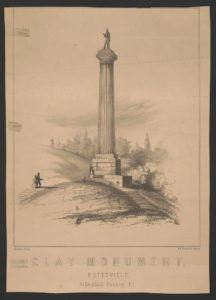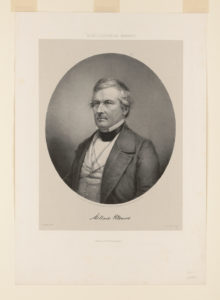It wasn’t just well-known radicals in and out of Congress. According to documentation at the Library of Congress, on March 11, 1867 some people in Pottsville, Pennsylvania promulgated a series of resolutions calling for the impeachment of President Andrew Johnson.
Benjamin F. Butler reportedly delivered his speech in Albany on March 2nd, allegedly implying that even bad political speeches were impeachable offenses.
Here’s a little on impeachment maneuvers in Congress 150 years ago. From The New-York Times March 7, 1867:
WASHINGTON.
Republican Congressional Caucus – …
Special Dispatch to the New-York Times.
WASHINGTON, Wednesday, March 6.
The Republican House caucus to-night was largely attended, and was a very lively affair, lasting until 11 o’clock until it adjourned. To begin with, it is proper to state that a secret caucus of extreme Radicals, called by BEN. BUTLER, was held this morning, for the purpose of ascertaining whether the projects for taking the impeachment investigation out of the hands of the Judiciary Committee, and putting it in the hands of a Select Committee of Thirteen, stood any chance of success. [That possibility was shot down, so Mr. Butler stood little chance “to cut a figure” in the impeachment investigation because he was unlikely to be appointed to the Judiciary Committee.] On the assembling of the caucus to-night ASHLEY opened with a ruse, by moving a resolution that the Judiciary Committee be appointed by the Speaker, to whom should be referred the record of the impeachment investigation as far as proceeded with in the last Congress. This ASHLEY did simply for the purpose of keeping both organizations in the hands of men of his ilk, for COVODE immediately moved a resolution that a select Committee of Thirteen be appointed for the impeachment investigation, when ASHLEY showed his colors and said he preferred that. [“after a long and somewhat bitter discussion,” the caucus decided that the Speaker should appoint the members of the Judiciary Committee] …According to Hans L. Trefousse, radical Ohio Representative James Mitchell Ashley “had been instrumental in the passage of the Thirteenth Amendment. Perfectly fanatical in his advocacy of extreme measures, Ashley had convinced himself that all presidents who had died in office had somehow been done in by their successors, and Lincoln was no exception. It was he who finally brought the first successful resolution looking toward impeachment.” [On January 7, 1867 Representative Ashley introduced a resolution impeaching “Andrew Johnson, Vice President and Acting President of the United States”. His resolution was referred to the Judiciary Committee.[1]
From the Library of Congress: James M. Ashley, the Henry Clay monument in Pottsville, and Millard Fillmore
- [1]Trefousse, Hans L. Andrew Johnson: A Biography. New York: W.W. Norton & company, Inc., 1997. Print. pages 282-283.↩




